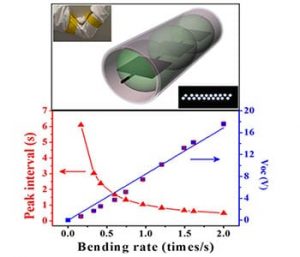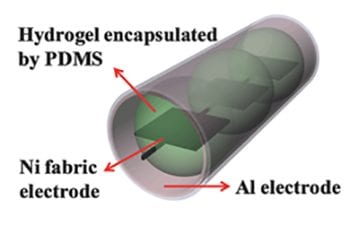Alongside the huge consumption of limited fossil energy, triboelectric nanogenerators (TENGs) as a sustainable power generation technology have progressed rapidly in recent years. Based on the conjunction of triboelectrification and electrostatic induction, TENGs can efficiently convert ambient mechanical energy into electricity with remarkable advantages. These benefits – such as a simple fabrication process, low-cost, diversity in constituent materials and extensive availability of target resource – make them promising candidates to drive modern electronics. In this regard, it is highly necessary to develop novel TENGs in an environmental friendly manner to meet the demand of a new generation of electronics.
Recently, Prof. Jianhua Hao’s group from the Hong Kong Polytechnic University introduced a hydrogel-based triboelectric nanogenerator (Hydrogel-TENG) to meet the challenge. The hydrogel, an environmentally friendly material with 3D crosslinking network of polymer chains, could be an ideal material to realize flexible and environmentally friendly TENGs. The 3D network structure of hydrogels leads to excellent mechanical properties and also remains environmental friendly. These advantages may result in the extensive applications of hydrogels in flexible electronics and green electronics.

In the research by Prof. Hao’s team the Hydrogel-TENG shows high safety and environmental friendliness with a maximum output power of 2 mW at a load resistance of 10 MΩ. Meanwhile, the excellent mechanical properties of hydrogels, such as high softness, flexibility, and elasticity, can provide the Hydrogel-TENG with the capability for harvesting mechanical energy from various human motions, including bending, twisting and stretching. Furthermore, the system can also serve as self-powered sensors to detect the human motions by analyzing the peak amplitude and peak interval of output voltage signals. Additionally, the utilized Polyvinyl Alcohol (PVA) hydrogel employed is recyclable to benefit the fabrication of renewable TENGs. The open-circuit voltage of renewed hydrogel-TENG can reach up to 92% of the pristine output voltage.
This research provides a potential approach for the development of flexible energy sources and self-powered motion sensors in an environmentally friendly way.

















